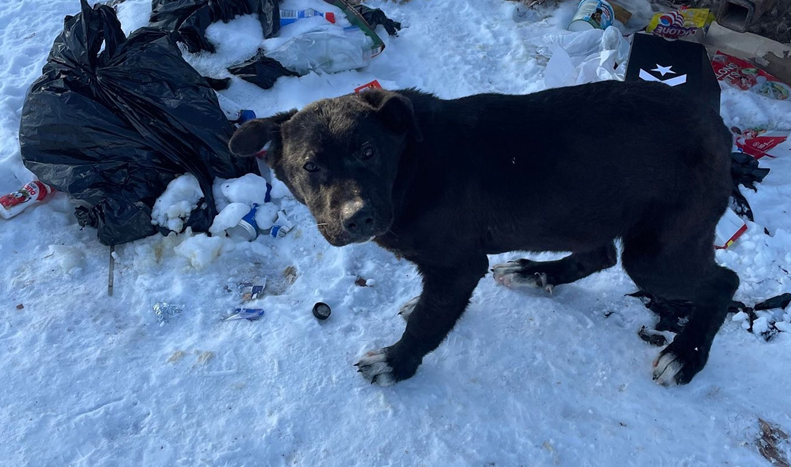Warning: This story includes images that viewers may find disturbing.

La Loche, Sask. had roughly 100 stray dogs saved by dog rescue organizations this week, but people working with the animals say this is a province-wide problem.
The village of La Loche put out a notice on January 26 that it would pay residents for two days to collect the “uncared for dogs in the community” and take them to the local animal shelter.
The notice said the dogs roaming the area were unfed, unhealthy and didn’t have shelter. The village also noted that they weren’t able to hire an animal control officer to help with the issue.
Jasmin Wenarchuk, founder of Running Wild Rescue based out of Moose Jaw, said she found out about the situation on Sunday.
A voucher of $10 was offered for each dog brought in, and Wenarchuk said they were very concerned about what would happen to those dogs after they had been collected.
Global News reached out to the village of La Loche to get clarification about the plan for those dogs but did not receive a response.
An updated notice was later sent out by the village, saying that 100 dogs had been collected and that dog rescues had come to pick them up.
Wenarchuk said not all of the dogs were rescued, calling this a band-aid solution.
“What needs to happen is that there needs to be rules and regulations set in place for this to stop because you don’t see dogs running around in Moose Jaw like that. We have humane societies where the dogs can go,” Wenarchuk said.
This isn’t the first time La Loche has had troubles with dogs over running the village, with a dog cull being called for back in 2019 that was eventually cancelled due to social media backlash.
_848x480_1573214275895.jpg?w=1040&quality=70&strip=all)
Wenarchuk said several rescues rushed out to the village when they heard the news of this dog collection and tried to rescue as many dogs as they could.
She said the dogs were taken to a safe place in Martensville, where they are being divvied up amongst dog rescue organizations.
“Why is this still happening? Like we’re all here to help, but we can’t do it without them wanting to solve the problem too.”
Wenarchuk reiterated that this a problem that isn’t restricted to La Loche, that these are issues that are coming up across rural Saskatchewan and the rest of the country.



She noted that rescues from other provinces are getting involved and coming to Saskatchewan to save these animals.
“If you check out the Victoria Humane Society they just came down and got 40 dogs and 40 cats and took them back because they do see that it is a crisis over here.”
She said the provincial government needs to get involved, saying this isn’t fair for the dogs.
“We’re just tired of doing the same situation over and over.”
Jemma Omidian, manager of animal care and community engagement with the Saskatoon SPCA said areas that don’t have access to an animal control officer will see these kinds of problems.
“This isn’t anything that’s new unfortunately, and not just isolated to the northern communities either,” Omidian said.
She said there’s not a lot of support in these situations and not many solutions without some sort of pound in place.
Omidian said they try to take some of these animals when they can but noted that the Saskatoon SPCA has limited resources as well.
“We’ve definitely seen an increase, especially during that cold snap we had, of these communities reaching out more and more with requests for transfer of these dogs.”

She said there are a lot of dogs and not many places to put them.
“It seems like every time we take a dog in there are ten more waiting to find a safe home.”
Omidian said in January they took in roughly 15 to 20 dogs.
The Saskatoon SPCA is still transitioning into its new facility and Omidian said they’ve had to rely on foster homes quite a bit as they continue to transition.
She said the only option for many residents living in rural parts of the province seeing stray dogs is to reach out to their rural municipality. She noted that people can reach out to dog rescues as well, but noted it all depends on their capacity.
“Unfortunately if we have nowhere to put an animal we can’t take them in.”
Omidian called for residents facing these problems to reach out to the province, saying that there is a lack of structure regarding any sort of animal control in rural Saskatchewan.
Advocacy has been building in parts of Canada after dog rescues had an influx of abandoned animals, with a rural municipality out of Manitoba creating a bylaw that would fine someone $1,000 if they abandoned an animal.
Abandoning an animal is considered a crime under the Criminal Code of Canada, but it has specific wording that means the act of abandonment itself does not necessarily lead to legal issues.
According to the Criminal Code, an owner of a domestic animal, bird or “an animal or bird wild by nature that is in captivity” who abandons it “in distress” or willfully neglects or fails to provide suitable and adequate food, water, shelter and care for it could either face jail time of up to two years or a $5,000 fine. They could also face imprisonment for no more than six months.
Global News reached out to the Government of Saskatchewan for comment and received a statement from the Ministry of Agriculture.
“Issues related to animal control bylaws, stray animals, population control and limiting the number of animals per household would fall under the purview of the responsible municipal administration. Information on these can be found under Saskatchewan’s Municipal administration.“
The ministry added that it takes animal welfare concerns seriously and linked to the province’s website regarding animal cruelty reporting.
– With files from Sean Previl






Comments